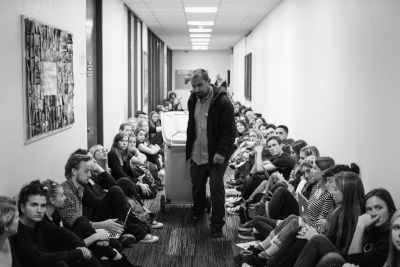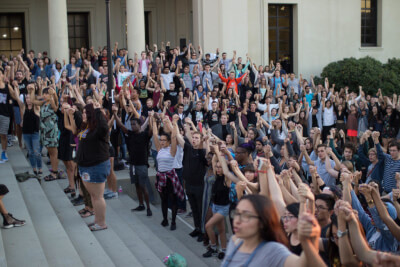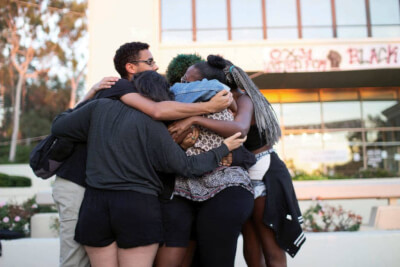
Nov. 16, 2018, marks the three-year anniversary of the occupation of the Arthur G. Coons Administrative Center (AGC) by student protesters. Over the span of five days in 2015, hundreds of students ate, slept and attended classes in offices and hallways, with several professors conducting teach-ins accessible to student protestors. Protesters outlined a series of 14 demands centered around increased and sustained support for marginalized groups on campus.
The occupation of the AGC followed similar protests across the country calling for greater administrative support for students of color. While the occupation began Nov. 16, a demonstration organized by Oxy United for Black Liberation (OUBL), a student group dedicated to advocating for black students, took place the preceding Thursday, Nov. 12. According to Occidental College’s website, more than 500 students participated, gathering first in the Academic Quad before moving to the front lawn of the Wallis Annenberg President’s House, the on-campus residence formerly occupied by President Jonathan Veitch. The demonstrations received support from the Black Student Alliance (BSA) and the Coalition at Oxy for Diversity and Equity (CODE).
The occupation ended Nov. 20, 2015, following Veitch’s Nov. 19 announcement of a plan that would begin to address students’ demands from the occupation.
Demands
The first demand called for Veitch’s immediate resignation. Veitch currently remains the president of the college, with his contract up for renewal in 2020.
The second and third demands called for the promotion of the Chief Diversity Officer (CDO) to a vice president position and a 50 percent increase in the CDO’s budget. In a Nov. 18, 2016 update, Chief Diversity Officer Rhonda Brown said that both demands had been completed at the time of the update’s release. The college promoted Brown to Vice President for Equity and Inclusion Feb. 1, 2016, and approved increased funding for the CDO on Nov. 25, 2015.
The fourth demand called for $60,000 in funding for the Diversity and Equity Board (DEB). As a result of the 2016 student election, DEB currently receives funding from student fees as opposed to directly from the administration itself. However, DEB’s 2017–2018 budget totaled approximately $41,000, which is lower than the $60,000 called for in the original demand.
The fifth demand called for the creation of a fully funded and staffed Black Studies program. The program officially opened for students in Fall 2018. It currently features two regular faculty members, Courtney Baker and Erica Ball, who are currently members of the American Studies department. There are no faculty members dedicated to the Black Studies major. There are three designated Black Studies courses; the remaining courses for the major and minor must be taken in other departments.
The sixth demand called for a 100-percent increase in the number of tenured faculty of color by 2020, which would entail going from 45 tenured faculty of color in 2015 to 90 tenured faculty of color by 2020. The demand also set a benchmark for a 20-percent increase in the number of tenured faculty of color by the 2017-2018 school year. The 2016 update listed this 20-percent increase demand as on track for completion. However, according to Vice President of Academic Affairs Wendy Sternberg, the amount of tenured and tenure-track faculty of color increased by 13.3 percent between 2015 and 2017, from 45 faculty of color to 51. Additionally, Brown stated in 2015 that the administration began utilizing a faculty search and hiring handbook drafted by the faculty Affirmative Action Committee to help find qualified faculty.
Brown noted in an email that while the school is committed to having a diverse faculty, meeting the goals set by the protesters is difficult due to the time required to conduct hiring searches for faculty.
“Meeting the ambitious goals laid out during the occupation was always going to be challenging, given the amount of time it takes to conduct national searches, the amount of time faculty have to devote to each search and the pipeline issues every college faces — we need to increase the number of [nationwide] doctoral students of color to increase the number of faculty candidates,” Brown said via email.
The seventh demand asked for funding for Harambee, a student group for black men. The Occidental was unable to verify the status of Harambee in 2018, though Presence — the online resource for current Occidental student organizations — does not mention Harambee, and the club does not have any visible social media.
The eighth demand called for mandatory training for all college employees in order to properly assist people from marginalized backgrounds. Brown said via email that Student Affairs currently conducts staff training sessions related to cultural diversity, and that there is a Cultural Diversity Advisory Committee — consisting of students, faculty and staff — that works with the Dean of Students Office on issues regarding diversity and culture in Student Affairs. According to Campus Safety Director Rick Tanksley, Campus Safety also participates in diversity training as well as trainings by Project SAFE and the Title IX Office.
The ninth demand called for the immediate demilitarization of Campus Safety, and the tenth demand called for the immediate removal of the Los Angeles Police Department’s (LAPD) presence on campus. According to the 2018 Annual Fire Safety & Security Report (also known as the Clery report), Campus Safety’s 17 full-time officers are unarmed. The report also states that Campus Safety maintains a close relationship with LAPD and calls on them as needed for serious crimes, but closely monitors their presence on campus.
“All law enforcement agencies are expected to check in with the Campus Safety Department when on campus,” the report reads.
The 2016 Memorandum of Agreement (MOA) that outlines the protocols for Campus Safety and LAPD’s cooperation is currently active but is also up for renewal, according to the 2018 Clery report.
The eleventh demand called on the administration to ensure the continued existence of the Intercultural Affairs (ICA) Office. According to Brown, the ICA does still exist, though it now reports to her directly as the Vice President of Equity and Inclusion instead of Student Affairs. Brown said via email that this does not change the ICA’s mission.
“The bottom line is that the overall goal of both the ICA and OEI [Office of Equity and Inclusion] is the same: to engage students and faculty, to enhance the learning experience and to support underrepresented students,” Brown said via email.
The twelfth demand requested the elimination of the First Year Residential Education program (FYRE) and the restructuring of Cultural Studies Program (CSP) courses to focus more on issues surrounding identity. Brown announced the discontinuation of FYRE in the Nov. 18, 2016 update. Brown also confirmed in that statement the creation of a faculty-student working group to discuss remodeling the college’s core program. CSP themes in the year of and years prior to the 2015 Occupation included “Sustainability” (2015-16), “Emancipation” (2014-15) and “Water & Power” (2013-14). CSP themes in the years since the occupation have included “Re-Envisioning Metropolis: Los Angeles and the Urban Arts” (2016-17), “(Eco)Systems of Power” (2017-18) and “Global Cities / Local Realities” (2018-19).
The thirteenth demand called for an increase in the number of physicians of color at the Emmons Wellness Center. As of Fall 2018, the center currently employs four counselors who identify as people of color, though student concern has prompted town halls calling for a review of Emmons resources for queer and transgender students of color (QTPOC).
The fourteenth demand requested that the college meet the demands made by CODE in reference to an arrest of a community member Sept. 5, 2015. The college responded by calling for a review of Campus Safety policy and protocols which were published by Campus Safety Advisory Committee (CSAC) May 2, 2016. According to Tanksley, CSAC is composed of students, staff and faculty and has its next meeting Nov. 14. The most recently published meeting minutes on the CSACs website are dated April 7, 2016. Tanksley also said that while he is aware of CODE and welcomes a discussion regarding their concerns, he has yet to have the opportunity to meet with them.
While Brown has not released any public updates regarding the occupation and the student protestors’ demands since 2016, she stated via email to The Occidental Nov. 12 that the administration is nonetheless committed to supporting marginalized students.
“Beyond the specific demands from 2015, I continue to support marginalized and underrepresented students in a variety of ways,” Brown said via email. “My office, together with the offices of the President, the Dean of Students, the Dean of the College and many others, have and continue to fund programming put on by student organizations.”

Reflections
The class of 2019 is the last group of students who attended Occidental during the occupation. However, according to Darby Pak (senior), most of the occupation participants have already graduated. Although Pak did not take part in the occupation, she said that the occupation quickly became common knowledge.
“Even from the edges, you could tell that everyone was talking about it,” Pak said. “Everyone was aware it was happening. I remember walking by and hearing someone’s phone call and hearing them explain [the occupation] to their parents. Even though I wasn’t super involved, I could tell how much of a galvanizing event it was.”
Pak also noted that although knowledge of the occupation spread quickly, information regarding the occupation remained unclear to many first years.
“My class was the most fringe of all the classes,” Pak said. We weren’t super tuned in to Oxy-specific issues since we hadn’t been there for many years. With each subsequent graduation, we lose more and more people who were involved.”
Ethan Heffernan (senior) echoed Pak’s sentiments about feeling distant from the occupation.
“I wasn’t very involved with it in the first place,” Heffernan said. “It was kind of something happening around me that I had a hard time participating in because I didn’t know what was going on.”

According to Antoniqua Roberson ’16, one of the leading members of Oxy United for Black Liberation, the group’s presence on campus diminished when its creators graduated.
“While not all of the leading members were seniors at the time, a majority of [OUBL] were,” Roberson said via Facebook message. “It seemed like when we graduated, OUBL did too.”
Oxy United for Black Liberation’s social media and website have remained inactive since April 2016.
According to history professor Paul Nam, he believes the administration’s lack of recent updates suggests that the administration wants to put the occupation behind it.
“I find it puzzling that, to the best of my knowledge, there hasn’t been a campus-wide discussion about the occupation and the demands,” Nam said. “I get the feeling that the administration just wants to let this current group of seniors graduate … and hoping that [the occupation] will become of the past and forgotten.”
Roberson expressed a desire that the administration will continue to honor the commitments made in 2015.
“I hope since [2015], Oxy has worked to make the campus a safer place for marginalized students,” Roberson said via Facebook message. “Oxy does a great job at recruiting students of color, but not so great a job of retaining them … [Oxy needs] to do a better job at fostering a community for these students to not just survive, but actually THRIVE.”
This story was revised Nov. 14, 2018, at 12:36 p.m. to clarify that the two professors of the Black Studies program are members of the American Studies department. There are no dedicated faculty members for the Black Studies major.
![]()






























